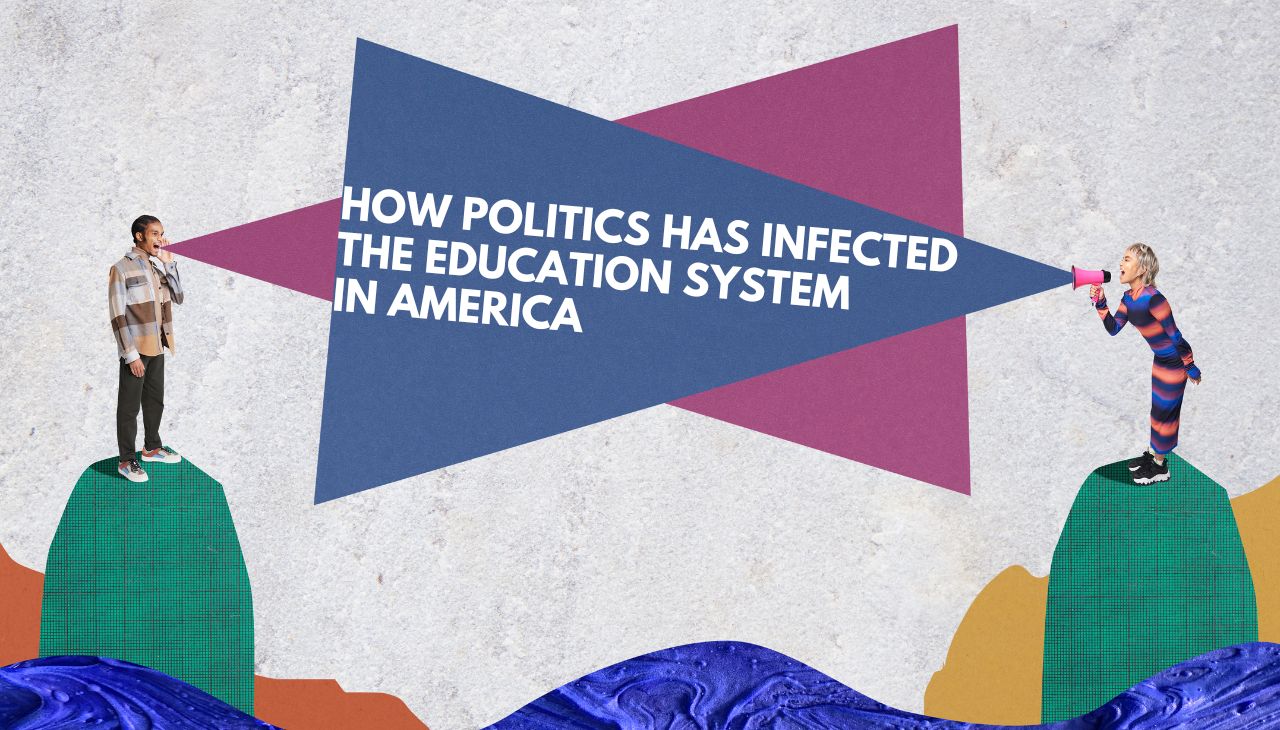
How politics has infected the Education System in America
The U.S.
MORE IN THIS SECTION
The U.S. education system has endured many challenges over the last couple of years from pandemic induced shutdowns, civil unrest, and how politics has made its way into classrooms all across the nation with 68% of parents worrying politicians are making decisions on what happens in the classrooms instead of educators.
On May 25, 2020, a wave of civil unrest in the United States was triggered by the murder of George Floyd during his arrest by Minneapolis police officers. Many protests and riots occurred in all major cities in the U.S in a clear much-needed protest against systemic racism towards African Americans in the U.S— demonstrations of unity prevailed during this time, impacting many across the globe to fight against the systematic racism and oppression imposed by other nations.
One simple outcry for change propelled many to rethink their stance of what color meant and how staying silent made them equally complacent as those imposing these laws, legislatures, and systems of oppression.
High quality education still does not exist in minority and poverty stricken sectors in the United States.
Education Next released its 16th annual survey of public opinion, reporting that 37% of Republicans gave a D or F grade to U.S. public schools this year, noting that “54% Democrats think their local schools are placing too little emphasis on racial matters, compared to 10% of Republicans. Meanwhile, 51% of Republicans think there is currently too much emphasis on racial matters, compared to 9% of Democrats.”
Critical Race Theory
Critical race theory (CRT) states that U.S. social institutions, criminal justice system, education system, labor market, housing market, and healthcare system, function under the premise of racism found in laws, regulations, rules, and procedures that dictate the outcome of different races.
Many interpret “social institutions racist” as attributing racism to white people instead of understanding that white people are in positions to generate change.
“Scholars and activists who discuss CRT are not arguing that white people living now are to blame for what people did in the past,” The Brookings Institution said. “They are saying that white people living now have a moral responsibility to do something about how racism still impacts all of our lives today.”
The relentless crusade to impede open discussion of racism, sexism, and issues of systematic inequality in the classrooms, means a population of students are not learning and understanding their history— PEN America reports that Texas has banned 713 books and Pennsylvania 441 thus far.
Idaho, Oklahoma, Tennessee, Texas, Iowa, New Hampshire, South Carolina, Arizona, and North Dakota had passed legislation last year, with Arizona’s legislation being overturned by the Arizona Supreme Court.
School Boards in Florida, Georgia, Utah, and Alabama introduced new guidelines barring CRT related discussion.
RELATED CONTENT
A prominent figure against CRT is Governor DeSantis, who announced late last year a legislative proposal to “stop w.o.k.e activism and critical race theory in schools and corporations.”
“In Florida we are taking a stand against the state-sanctioned racism that is critical race theory,” said Governor Ron DeSantis. “We won’t allow Florida tax dollars to be spent teaching kids to hate our country or to hate each other. We also have a responsibility to ensure that parents have the means to vindicate their rights when it comes to enforcing state standards. Finally, we must protect Florida workers against the hostile work environment that is created when large corporations force their employees to endure CRT-inspired ‘training’ and indoctrination.”
The widespread misinformation continues to allow many to fight against what they don’t seem to understand. CRT isn’t enticing overthrowing the government as capitalist ideologists are propagating their views to citizens and further aid the narrative they have constructed and hold to be “true.”
Another social institution that has undoubtedly affected African Americans significantly is healthcare— most people in need of transplant are people of color. They are “more than three times as likely to have kidney failure than white people,” Mayo Clinic reports. “Experts are hoping a new requirement that all U.S. transplant centers use a race-neutral formula to determine eligibility for a kidney transplant will improve African American access to lifesaving transplants.”
“This is an essential step toward reducing racial inequity in access to kidney transplantation,” says Naim Issa, M.D., a Mayo Clinic nephrologist. “The inclusion of race in the calculation of kidney function has been linked to disparities in care for African Americans, including delays in diagnosis of kidney disease and eligibility to be put on the waiting list for a kidney transplant.”
Nevertheless, the strides to eliminate unlawful discrimination by social institutions continue— affirmative action seeks to eliminate discrimination among college students in an effort to remediate prior discrimination and prevent such discrimination from happening in the future. Last week, the U.S. Supreme Court began hearing oral arguments of affirmative action in higher education in the lawsuit against Harvard University and the University of North Carolina. Some experts say that banning affirmative action would be a setback for inclusion and equity for students of color.
Equity still does not exist in social institutions. The idea that it does continue to discredit the importance of equality among these spaces giving opportunist to benefit from misinformation.







LEAVE A COMMENT:
Join the discussion! Leave a comment.